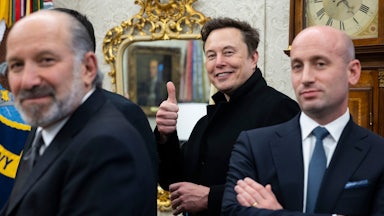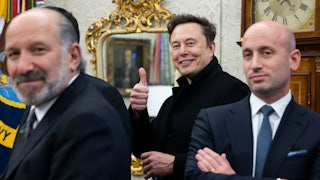As the world experiences what could be its hottest year on record, the right-wing groups behind the Project 2025 policy road map for a second Trump administration want to supercharge oil and gas drilling, claw back regulations and research funding, and “eradicate climate change references from absolutely everywhere,” according to one training video reported last week by ProPublica.
Yet a senior staffer at one of the groups that’s contributed to Project 2025, the Center for Renewing America, or CRA, seems to have some doubts. In previously unreported private remarks, Micah Meadowcroft—who served in the Environmental Protection Agency during the Trump administration, and is now CRA’s research director and a contributing editor of The American Conservative—takes issue with the way Republicans talk about environmental policy.
The GOP, Meadowcroft said in secret recordings taken by the Centre for Climate Reporting, transcripts of which were shared with The New Republic, tends to believe “that environmental care is not something you have to care about. You just produce enough wealth, and then you can just buy your way out of whatever pollution deficit you put yourself into later. So it’s a luxury good. Keep industrializing. Keep doing whatever. We’ll worry about it later. And someone will have a technological breakthrough, and it’ll eat all the plastics in the ground.” Meadowcroft called the approach “a silly thing to count on as a selfish, definite, you know, assured prophecy thing.” Meadowcroft did not respond to a request for comment on these remarks by publication time.
The approach that Meadowcroft calls “silly” sounds a lot like Project 2025’s “Mandate for Leadership,” the 900-page document laying out the coalition’s governance agenda, on which Meadowcroft himself is listed as a “contributor.” After calling to abolish the White House’s Climate Hub Office, the Mandate for Leadership’s authors argue that “history shows that economic growth and technological/scientific advance through human ingenuity are by far the best ways to prevent and mitigate extreme weather events.”
Meadowcroft’s private remarks were recorded as part of a monthslong investigation by the Centre for Climate Reporting into Project 2025, published last week. A paid actor and a reporter, each working undercover for CCR, posed as the relatives of a wealthy conservative donor interested in Project 2025, mulling a donation to CRA. They arranged a meeting with the group’s founder and president, Russel Vought, who was also director of the Office of Management and Budget under Trump. Before Vought arrived, the actor and the reporter placed cameras around the Washington, D.C., hotel suite where they convened. The meeting with Vought was arranged with Meadowcroft’s help. The reporter had met Meadowcroft weeks earlier at the National Conservatism convention, or NatCon, in Washington, D.C. Like Vought, Meadowcroft didn’t realize he was conversing with undercover investigators.
Neither the Center for Renewing America nor the Trump campaign responded to CCR’s requests for comment, but CRA’s communications director said on social media: “None of this is secret. Would’ve been easier to just google to ‘uncover’ what’s already on our website & in countless media interviews.”
During NatCon, in private, Meadowcroft opined that the GOP and “green left” tend to fall into a similar trap when talking about the climate: “Republicans historically and the green left both engage in, I think, a very silly techno-optimism in their approach to environmentalism,” Meadowcroft said. He seems to view that “green left” as historically overoptimistic about what kinds of technologies are available to cut pollution, including when it comes to electric vehicles and vehicle emissions standards. Those leftists continue, he complains, “to persist in saying, ‘Look, you’re all going to drive electric vehicles in 10 years.’ OK so when are you going to build a grid that can support the charging stations, have enough saturation for the charging stations, and also just bring down the price of vehicles such that they’re affordable to the middle class? And they just wave their hands and say, ‘We’re going to save the country. We don’t have to figure that one out. It’ll just happen.’ They think the technology will catch up with the regulation.”
The correct approach, Meadowcroft argues, is to first “admit that we’ve done a marvelous job of cleaning up American air and water,” particularly through the Clean Air Act, which he called “hugely successful” but “overly enforced.” He then seems to suggest that—rather than continually updating EPA pollution rules to account for new kinds of pollution and new data on the harms it causes—the government should decide once and for all “what we think clean air looks like.” The government shouldn’t, he says, “keep looking to lower and lower and lower limits of pollution.”
Definitions of what are referred to as “systems of pollution control” are not explicitly spelled out in the Clean Air Act; neither, as Meadowcroft notes, does the act define some absolute, fixed definition for what constitutes clean air. Now that the Supreme Court has overturned what’s known as the Chevron doctrine, which gave administrative agencies broad latitude to interpret and bridge these sorts of gaps, judges may soon be in a position to decide what “clean air” means themselves. That’s especially worrying considering just how many right-wing judicial appointments—from SCOTUS to the federal court system—have been active in groups like the Federalist Society, which receives funding from some of the same dark money donors backing Project 2025.
Vought and Meadowcroft don’t spend much time, in the recordings made by CCR, talking about climate policy. But what they do say largely echoes what’s in Project 2025. Vought talks about “repealing that Biden initiatives like the Green New Deal and things of that nature, fake infrastructure.” That’s part of a larger attack on what he calls “woke and weaponized bureaucracy.”
“We probably need to get rid of NEPA,” Meadowcroft says at one point, referring to the National Environmental Policy Act, which requires federal agencies to consider the environmental impacts of permitting decisions. He calls the NEPA review process “just insane. And it doesn’t seem reformable. It needs to be just scrapped and then restarted.”
A second Trump administration would have an unprecedented number of tools at its disposal to pursue these kinds of policies—as well as the others laid out in Project 2025. Comments like Meadowcroft’s—essentially, taking jabs at his own side—show a divided movement that fears dissent within its own ranks; in his conversation with the undercover reporters, Vought is even more fearful that not everyone in Trump’s camp is a true believer. Decades of right-wing efforts to undermine democracy and take over the judicial branch, though, mean that even a divided right would be more empowered than ever to enact their preferred policies.








